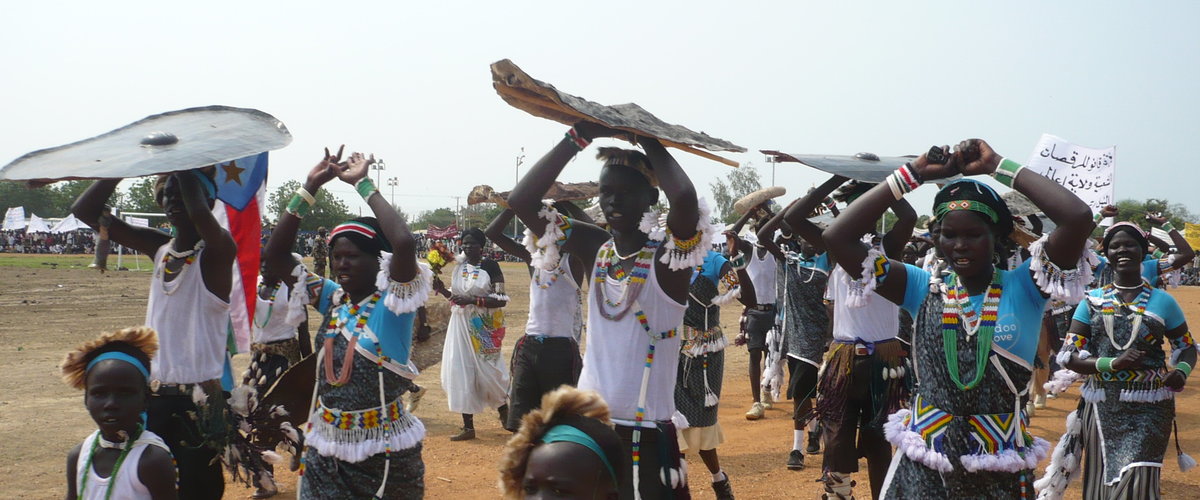Closure of UNMIS
UNMIS wound up its operations on 9 July 2011 with the completion of the interim period agreed on by the Government of Sudan and Sudan People’s Liberation Movement in the Comprehensive Peace Agreement (CPA), signed on 9 January 2005.
The mission ended its six years of mandated operations the same day South Sudan declared independence, following a CPA-provided referendum on 9 January 2011 that voted overwhelmingly in favour of secession.
In support of the new nation, the Security Council established a successor mission to UNMIS – the UN Mission in South Sudan (UNMISS) – on 9 July for an initial period of one year, with the intention to renew for further periods as required.
9 Jul
2011
9 July 2011 - Malakal stadium today was filled with thousands of people who had flocked from all corners of Upper Nile State to celebrate the independence of South Sudan.
Included in the crowd were youth, women, school children, church officials, military, police, veterans and tribal groups like the Shiluk, Dinka and Nuer.
The celebration was opened with a reading of South Sudanese history and the independence struggle by two local youth. People then began marching, dancing and singing.
Opening the event, Upper Nile State Minister of Information and Communication Peter Lam Both congratulated South Sudanese people on gaining their freedom. "We are going to defend our country with whatever it takes," he said.
Mr. Both also recognized efforts by South Sudanese to gain independence -- women who had cooked for the Sudan People Liberation Army during the wars, soldiers who had died on the battleground and veterans.
"Today I want you to know that you are free and we should be proud because this freedom is (for) a lifetime," the information minister said. "This independence is not achieved by one effort but all South Sudan people."
Upper Nile State High Committee (for independence) Chairman Andrea Maya, who is also the deputy governor, concurred that South Sudan's independence was a collective effort. "We were struggling for 50 years and we're finally celebrating our freedom."
The new South Sudan flag was raised after it was brought to Upper Nile State Governor Simon Kun Puoch by both government and tribal representatives. The national anthem was sung after the flag had been hoisted.
The ceremony, which was also attended by representatives of UNMIS, UN agencies, non-governmental organizations and state counterparts, was cut short by the crowd's enthusiasm to sing and dance after the flag raising.
Governor Puoch encouraged people in the state to use its resources wisely. "We have to work together to develop our country so we can realize our dreams -- building bridges, providing clean water and electricity, and establishing agriculture so our economy will grow."
He also stressed the importance of having a good relationship with the North (Sudan), "They are our brothers, we should not lose our relationship. This also can stabilize our economy to keep goods coming from the North to the South."
In neighbouring Jonglei State, people of Fangak County began celebrating on the evening of 8 July with prayers, singing and dancing ahead of the official ceremony the next day.
"People from surrounding villages have gathered here in Phom El Zaraf and some more are on the way now," Fangak County Commissioner James Maluit Ruach told an UNMIS team visiting the area yesterday 8 July.
Speaking about life after independence, Mr. Ruach acknowledged that the government must build up its capacities. "South Sudan has a lot of resources, but now the question is how to utilize them."
The commissioner planned to tour Fangak County payams (townships) after independence to boost people's confidence. "We (the government) need to unite South Sudan people and improve the infrastructure."
The county is currently struggling with various problems, including food and shelter for displaced persons, landmines and Kala Azar disease, which infects about 15 people each day.
The World Food Programme has provided food and non-food items to the displaced, the World Health Organization has supplied medicine for Kala Azar and the Lutheran World Provision as well as the International Committee of the Red Cross have distributed seeds so people can begin cultivating.
 UN
UN United Nations Peacekeeping
United Nations Peacekeeping





